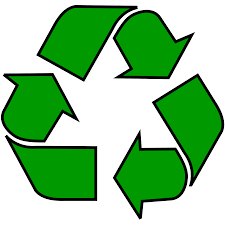 |
How to Dispose of (nearly) Anything |
 |
 |
How to Dispose of (nearly) Anything |
 |

| Willersey has a facebook page. Home Page | Menu & Search Page Email us here:- |
Anything of Value Take it to an auction such as Littleton Auctions for an assessment and maybe entry into one of their fortnightly sales. Used Batteries Take them to the collection bins in shops such as Nisa and the Co-op in Broadway. Just under 10% of portable batteries in the UK are recycled. New regulations which came into force on the 1st February 2010 require recycling levels to rise to 45% of batteries placed on the market by 2016. This equates to over 500 million batteries per year. Car Batteries. Used Stamps The Post Office in the Co-op in Broadway collects and sells these for charity. Clothes The nearest collection bin for clothes and shoes is the Salvation Army bin on the Childswickham Road in Broadway. There are many local charity shops, with the nearest being the three in Broadway. They are Break 64a High Street Tel: 01386 859020, Sue Ryder 2, Kennel Lane, High Street Tel: 01386 853925 and St Richards Hospice The Shop is called “Snowdrops”. 15, The Green Tel: 01386 854686 . Oxfam and the Salvation Army, both in Evesham, take clothes in any condition from new to totally worn out. They sort them for sale, either in an appropriate retail shop, shipping abroad, provision to good UK causes or as a last resort use as industrial wipes, pet bedding or insulation. The Steam Railway maintenance sheds in Toddington collect used fabrics to use as industrial wipes. Try to wear any item of clothing at least 30 times before passing it on. About 350,000 tons of clothing goes to landfill in the UK every year. Often a plastic bag from a charity is delivered to your house and typically promises that say £75 to £110 for each tonne of collected clothes will go to the charity. This article claims that the clothes are worth more than this. Maybe its much better to deliver directly to your chosen charity? Here is some more background on this. (To maximise the profit to a charity, do buy any Christmas cards from the charity shop directly.) If you pay tax in the UK, do register for Gift Aid with the charity shop. While on bags, England at last caught up with the rest of the UK on October 5th 2015 with retailers charging at least 10p per plastic bag. Small shops will be exempt but hopefully many will still charge. How to preserve forensic evidence after being raped or experiencing sexual violence. Forensic evidence might not be the one of the first things someone thinks about after such a traumatic event, but knowing what to preserve if someone comes to you for help could make an important contribution to a criminal case if they choose to pursue one. Fact: The Hope House Sexual Assault Referral Centre (SARC) can store forensic evidence for up to two years if someone is unsure about reporting to the police immediately. Don't wash any part of your body. Don't brush your teeth. Don't brush your hair. Keep a sample of urine. Keep all of the clothes you were wearing safe, in a new plastic bag and don't wash them. Keep any condoms. Keep any used cups or glasses. Keep any panty liners, sanitary towels and tampons you were wearing. If possible put them in a paper bag. Keep any cigarette butts. Read more about the campaign on rape and sexual violence at Survey statistic taken on 17/12/2018. Daily Living Aids Items such as crutches, wheelchairs, rollators, walking frames and smaller items can be donated to any Hospital or Hospice rather than being discarded. The Sense charity shop in Cheltenham Tel: 01242 501506 GL50 1EG will take crutches, wheelchairs etc and so will Prestbury library Tel: 01242 234540 GL52 3DN . You can also recycle empty medication blister packs in Cheltenham, Worcester or Stroud etc. Old Towels and Bedding Take them to The Dogs Trust in Wickhamford. They can be left in the corner by their door if not open. Not strictly old bedding totally but sheep fleeces have been found to be an excelent weed supressant and frost protection under grape vines. You could also use old pure wool clothes. As the wool decmposes it becomes a good lomg term fertiliser. Ferrous or Non Ferrous metal Non ferrous metal in particular can be surprisingly valuable. Gas cookers are heavy and have some scrap value. Furniture You can sell better quality furniture at the auction - see above. The Sue Ryder Charity shop and St Richard's Hospice shop in Evesham both take furniture as well as other household items including large and small electrical goods. If you are a UK tax payer, then do register with your chosen charity shop(s) and they can reclaim the tax back to increase their revenue from your items by 25%. St Richard's will also take bicycles. Roundabout in Evesham ( Tel:01386 83 30 30 ) will collect furniture from you for delivery to those in need. Go to top House Clearance If you need a house cleared for any reason then St Richard's Hospice offers a service to do this. Garden Cuttings and Lawn Mowings Either compost them in a heap in the corner of your garden or sign up to the council's garden waste service at £69 per year. You can put the following items into your garden waste bin :- Grass cuttings Leaves, bark and tree prunings Twigs and small branches up to 5cm (2in) across Tree stumps up to 10cm (4in) across Bedding from herbivore pets (rabbits and guinea pigs etc) Cut flowers Plants and weeds Windfalls from your garden trees Vegetable waste from the garden (e.g. potato tops) Real Christmas trees (cut into 2-3ft sections to fit in your bin and please remove decorations!) Kitchen roll Tissues Cold wood ash Food waste goes in your separate food bin. After Christmas you can also take any real Christmas trees to be shredded and composted at Batsford Garden Centre, Moreton-in-Marsh, GL56 9QB. To efficiently compost at home, divide your compostable material into greens and browns. Examples of greens are fruit and vegetable peelings, apple cores, teabags, coffee grounds, grass cuttings and old flowers. Browns are dry hedge trimmings, twigs, torn up cardboard and paper, paper mache egg boxes, egg shells, tissues, paper tubes, shredded paper, straw and hay. The ideal mix is roughly 50:50 of each by volume. Pile into a heap on garden soil, ideally greater than one cubic metre in volume. Cover and keep damp. Turn occasionally to mix well rotted with new. Wait for six months according to the weather. (Gerbils really appreciate cardboard tubes from say toilet roll and kitchen towels.) Bonfires Do you really need a bonfire? Try composting your garden waste. (see above). The compost you produce will do good to your garden. Pay for a Green bin so the council can compost it for you. If you really must have a bonfire dry your garden waste as much as possible. Choose a day with a light breeze. Light your bonfire with dry wood to give plenty of heat and a good flame. Add waste items to the fire slowly so each addition burns well with a flame. Do not pile on plenty of material so it smokes for hours. Try not to leave your bonfire for long so you can monitor it. (Dried evergreen tree prunings can burn very quickly because of the resin they contain.) Bonfires are always an issue during the summer months and the Parish Council are requesting the cooperation of all residents to consider their neighbours. The police can enforce laws regarding public nuisance so the Parish Council wishes to avoid such situations arising and the disharmony in the village that would follow. Dog Fouling Dog Fouling Leaflet. Used Stamps, Toothbrushes,Empty Toothpaste Tubes and Used Brush Heads Please take them to “Imagine” in Evesham, Evesham Abbey Trust or the Hallway of 105 High Street,Evesham. Surplus Fruit Because of its history there are many, many fruit trees in the area. Apples, pears, plums and cherries are the commonest. Of course you can eat them fresh but faced with a glut, try making jams, chutney, pickling, cooking & then freezing, storing individually wrapped in a cool place and drying. You can also ferment them to make alcoholic drinks. Swap with your neighbours. Maybe you can find someone who keeps chickens, horses or cattle which would like them. Plastic Plant Pots The Garden Centre at Batsford Arboretum collects then for subsequent recycling. Telephone Clive on 07884478871 or 853324 and he will collect them for recycling. Old Car and Bike Tyres Vehicle tyres (excluding bicycle tyres) will no longer be accepted at Household Waste Sites from the 1st of April 2023. Tyres can be disposed of by an authorised tyre fitter, or tyre disposal company. Spectacles Greys Opticians in Chipping Campden High Street will take any unwanted glasses. Go to top Small Electricals These items are electricals and can be recycled. 1. Smoke detectors 2. Vapes 3. Cables 4. Fairy lights 5. Remote controls 6. Computer mice All of these items are small electricals and they can be recycled using our kerbside service (and if you live in Cheltenham, Cotswold, Forest of Dean, Gloucester or Tewkesbury) Books Willersey Garage sells books for charity. Hidcote National Trust Garden has a secondhand book shop so any unwanted books you may have would be most welcome. Books can be easily handed in at the garden reception office in the car park. You could also donate books to the Willersey book exchange. Another possibility is to take them to any of the charity shops in the area or Willersey Garage for resale for charity. Imagine in Evesham collects books for its extensive library. Some examples of other items to take to charity shops - and there is a wide choice of them locally. CDs, bric-a-brac, unbroken china, clothes, shoes, used computer printer cartridges - both inkjet and laser, tapes, hand tools, mobile phones, toys and vinyl records. Some charity shops, eg Oxfam take foreign coins and stamps. Donate Used Books Recycling Survey What would encourage you to recycle more? How often would you like your recycling to be collected? These are just some of the questions in a survey that Cotswold District Council launched to gather views about the sort of waste/recycling service that is the best fit for the District and also the County as a whole. Our service provider Ubico Ltd needs to replace its existing fleet of kerbside collection vehicles during 2019 as the current ones will be at the end of their service life. Improvements in technology should mean that the new vehicles will offer smarter and more efficient ways of collecting recycling and the council are seeking the views of residents to help maximise the benefits of these advances. Cotswold District Council has reported savings of over £52,000 and an overall collection rate of 99.9% as a result of the new innovative In-Cab technology installed in 2021 in its waste collection vehicle fleet. As part of the goal to enhance, modernise and streamline its services, Cotswold District Council installed the technology in 2020, to improve collection rates and reduce service issues. Ubico, who deliver the service on behalf of the Council are now able to more efficiently manage collection rounds and provide a better service to residents. Cotswold DC collect 8 million containers a year over a huge area and every improvement makes a big difference. Customer calls to the waste line were reduced by 31% within the first month of the system being introduced. This is made possible by new technology that allows crews to communicate directly with the depot and customer services, with enquiries or issues being responded to much faster. Using GPS, rounds can now be monitored and issues can be logged by the crews so data is instantly available on the performance of the collections. This has made our waste collection fleets more efficient and economical, reducing environmental and resource impacts. Glass Bottles and Jars, Cans, Tins, Plastic Bottles, Paper and Cardboard These are collected by the council in various recycling boxes and sacks. Find your day to put out your bins. From Monday 19th September 2016 our bin collection day in Willersey is Monday. Over time, crew members working for Cotswold District Council's waste service provider, Ubico Ltd, have sustained cuts when emptying recycling boxes containing broken glass. This is a significant health and safety hazard and Ubico has instructed crews not to collect boxes when they see that they contain broken glass. However, there may be times when the hazard is not apparent and we are urging the public to help them avoid this risk. Please follow these five simple steps to ensure that recycling is presented safely and considerately: Step 1 Use one black recycling box for paper and magazines. (If you only have room for one box - put the papers at one end and the glass at the other). Step 2 Use a second black recycling box for all glass bottles and jars - no broken glass please. (Order a second box if you need one). Step 3 - Use the white recycling sack for tins/cans, aerosols, plastic bottles, food trays, yoghurt pots and other types of mixed rigid plastics. Step 4 Use the blue recycling sack for corrugated (brown coloured) cardboard or light (grey coloured) card. Step 5 Use the green caddy for food waste, unless you use a garden Waste Bin. Residents with broken glass are advised to wrap it in newspaper and place it in the grey waste bin for collection. District councils such as the Cotswolds are responsible for waste collection while county councils including Gloucestershire manages waste disposal. Most waste is incinerated at Javelin Park. Changes ahead for Gloucestershire Recycling Centres. To reflect the 25% reduction in custom throughout the winter months, the five Household Recycling Centres (HRCs) in Gloucestershire will be reducing their opening hours as of October 28th. As the evenings get colder and darker, the HRCs across the county receive less waste and recycling; by almost 30%. To reflect this and save taxpayers money, seasonal opening times are being introduced. When the clocks go back an hour, HRCs will be open from 10am until 4pm. Each centre will also be closing for one day a week. When summer returns in 2019, HRCs will open an hour earlier at 9am and close an hour later at 5pm. Each site will still close one day a week. A great deal of consideration has been given to seasonal and daily site usage patterns at each of the centres. These changes are not only reflective of when they are used, they are also supporting a reduction in the budget for this service and making sure the council is living within its means. Midweek closure days announced for Gloucestershire recycling centres. From 28th October 2018 Gloucestershire County Council Household Recycling Centres (HRCs) will be closed one day mid-week, either on a Tuesday, a Wednesday or a Thursday. As the evenings get colder and darker, the HRCs across the county receive almost 30% less waste and recycling. In order to reflect this and save taxpayers money, HRCs will be open from 10am until 4pm, six days a week. On Tuesdays, Fosse Cross (Cirencester) and Oak Quarry (Coleford) will be closed. On Wednesdays, Pyke Quarry (Horsley near Stroud) and Wingmoor Farm (Bishops Cleeve) will be closed. On Thursdays, Hempsted (Gloucester) will be closed. Gloucestershire County Council has collected data from recycling centres and this told us that midweek is the quieter period at our sites. This closure rota also means HRCs in the county will still be open on Bank Holiday Mondays and Good Friday, which are especially busy periods at the sites. More information on the closure days, new seasonal times and your nearest alternative site can be found online at www.recycleforgloucestershire.gov.uk. Go to top Cotswold District Council is launching a five simple steps campaign which asks residents to pre-sort their recyclables before they present them for collection at the kerbside. At the moment, residents tend to use: a black box for all used paper, magazines, glass items, cans/tins; a white sack for mixed plastic bottles, pots, tubs & trays; and a blue sack for cardboard. However, the Council is now encouraging people to keep paper and magazines separate from glass items - either within the confines of one black box (if they only have only room for one) or by acquiring a second black box at no cost. To make life easier, residents can now place tins/cans and aerosols into their white sacks with plastics as these can now be separated at the recycling plant.
The five simple steps are as follows: Step 1 Use one black recycling box for paper and magazines. (If you only have room for one box - put the papers at one end and the glass at the other). Step 2 Use a second black recycling box for all glass bottles and jars - no broken glass please. (Order a second box if you need one). Step 3 - Use the white recycling sack for tins/cans, aerosols, plastic bottles, food trays, yoghurt pots and other types of mixed rigid plastics. Step 4 Use the blue recycling sack for corrugated (brown coloured) cardboard or light (grey coloured) card. Step 5 Use the green caddy for food waste. From March 2020 there were some changes in the Willersey's rubbish collection. The changes mean that you: *** will get a new blue bag for cardboard to give you more capacity. (It will no longer be collected loose!) *** can recycle extra items including textiles and shoes, batteries, cartons and small electrical items. *** need to keep food waste separate and put it in your new outdoor food waste bin which is collected weekly. Refuse and recycling will still be collected fortnightly. Garden waste will switch from weekly to fortnightly on the same day as your other collections. Make sure that you have the right number of recycling containers. You will need two recycling boxes, one for paper and the other for glass. If you do not have the right containers by 6th March contact CDC on 01285 623123 or email customer.services@cotswold.gov.uk You can now recycle plastic-lined paper cups thanks to an initiative by the Alliance for Beverage Cartons and the Environment (ACE UK), in partnership with Cotswold District Council and Gloucestershire s Joint Waste Team. This is only really useful for Willersey at present if you happen to be in Stow-on-the-Wold! Plastic-lined cups - the sort commonly supplied by coffee shops, fast food outlets and petrol stations can now be recycled by depositing them in any of the food and drink carton recycling banks within the district - see below. Ideally drink from re-usable cups where possible and it is good to see that most coffee shops are more than willing to fill a reusable cup if brought into the shop. People in Britain are currently responsible for binning 25,000 tonnes of beverage cups every year. Carton banks in Cotswold District are located at: Andoversford Village Hall Bourton-on-the-Water (Rissington Road Car Park); Cirencester Waterloo Car Park Fairford Hatherop Road Stow-on-the-Wold Maugersbury Road Car Park The UK recycles only 52% of its plastic bottles. (September 2021). You can take any glass jam jars to Dorothy Hart 840869 at Chipping Campden lower town hall for reuse any Friday between 9:00 and 11:00 am. Flatten cardboard and paper and please remove any internal plastic and external plastic wrappers. Black plastic food trays are not too welcome as the automatic sorting machines cannot see them. The council will not collect extra refuse from you but it will usually collect extra recycling. This is the comprehensive list of Wychavon recycling banks. Waste plastic accumulating in the oceans has a devastating effect on wildlife. Here is one possible solution. 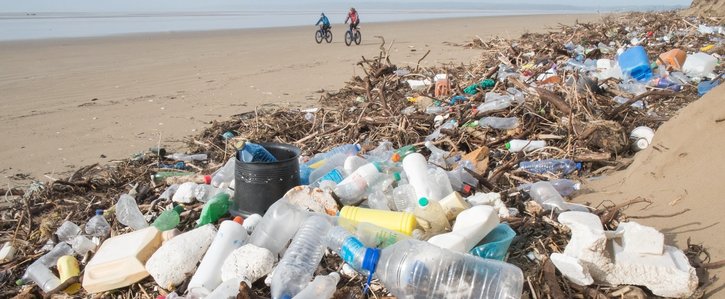 If you buy a plastic bottle of water, do refill it from the tap multiple times before you discard it. Each family uses an average of 440 bottles a year. Each bottle takes 7 litres of water to make. In the UK we use a staggering 38.5 million single-use plastic bottles and a further 58 million cans every day! Only half of these are recycled, so it's no surprise that many of these end up on our beaches and in our oceans. Plastic bottles take 450 years to break down, killing marine life, harming the coastal ecosystem and ruining our beaches. Placing a small deposit on plastic bottles and cans would dramatically increase recycling and reduce marine plastic pollution. For full information on deposit return systems please visit Surfers Against Sewage's Message in A Bottle campaign site. The UK lags behind many other countries. The UK may have a bottle charge soon. As of October 2020, plans are in place (finally) to put a 10p deposite on plastic bottles by 2023. Plastic straws,cotton buds and coffee stirrers are already banned in the UK. Some unnecessary plastic items. 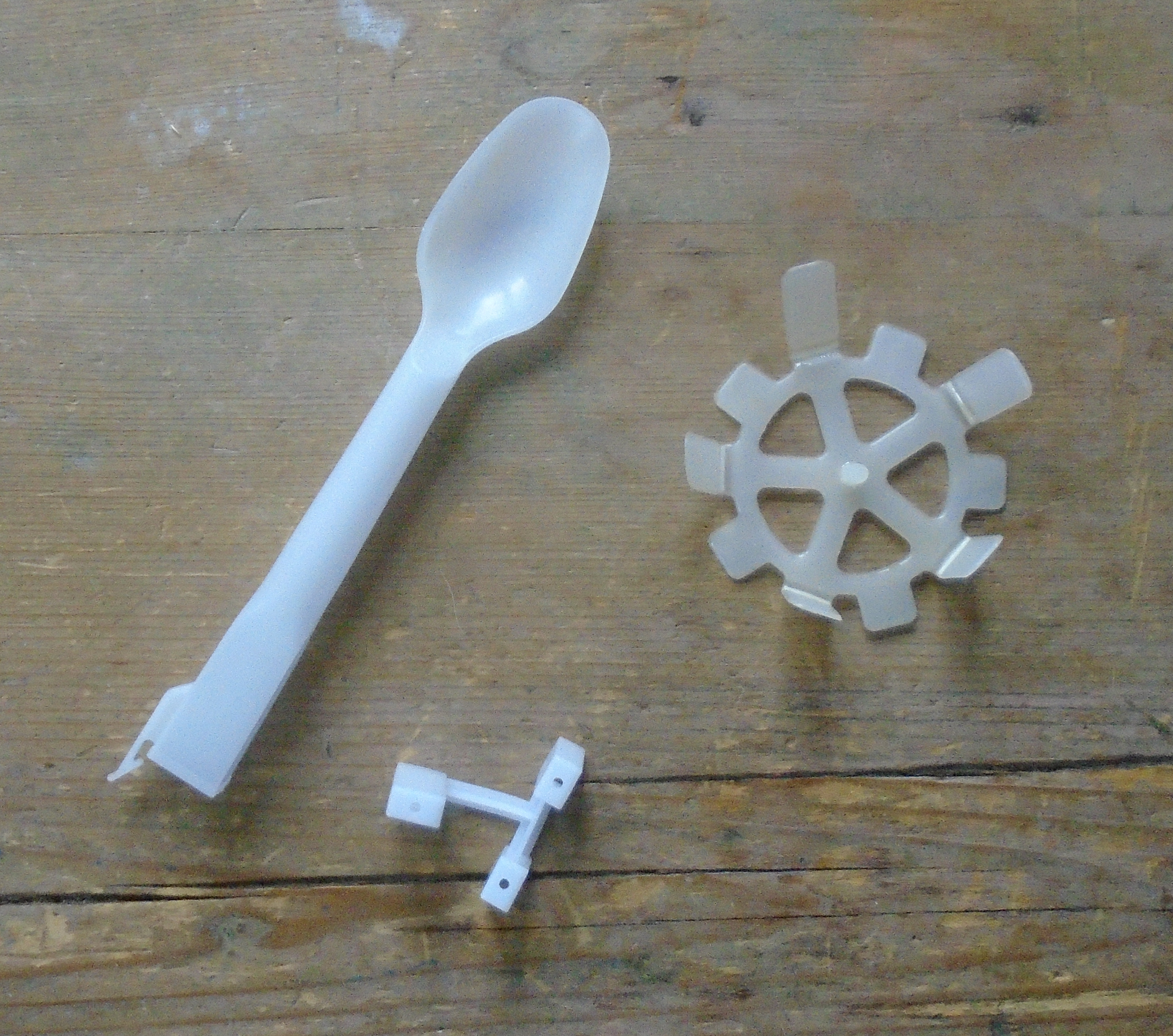 Go to top Plastic Bags 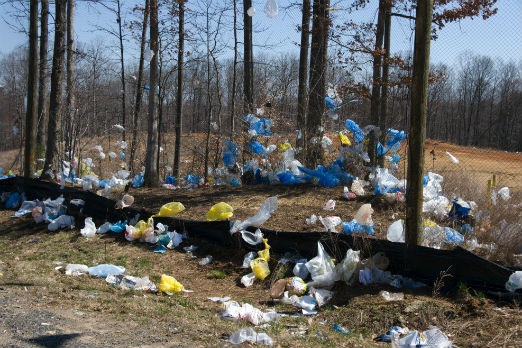 England has at last caught up with the rest of the UK from October 10th 2015 by charging 5p or 10p for one trip bags. Under the government's rules shoppers are not charged for plastic bags which are used for uncooked fish, uncooked meat and poultry, takeaways, loose seeds and flowers, unwrapped blades (including axes, knives, and razor blades), prescription medicine and goldfish. The rules also list a series of bags which should not incur a 5p charge, including woven plastic bags, paper bags, re-usable bags-for-life and bags used by service providers such as dry cleaning or shoe repair shops. Under the new rules a bag can contain multiple items from this list and not incur a charge but if the bag contains any other items then it must be charged. Here are some of the official rules. (Is the government really trying to reduce red tape?) Demand for plastic bags has dropped dramatically. Do reuse any of your bags you do buy. At the checkout bags cost 5p, are convenient, easy to dispose of and then someone else's problem. In the world, they use oil to make, take decades or longer to decompose, are poisonous if burnt without precautions, are a wildlife hazard and are everyone's problem. Had Henry VIII used a plastic bag it could still be around today! An even more troublesome form of plastic pollution are microbeads found in mostly cosmetic products. They are not trapped by filters at the works and end up in the oceans where they enter the foodchain and come back to us when we consume fish. Longterm they will severely reduce the health of the oceans (and maybe ours). Does the product you use use contain microbeads? Because of plastic pollution in the oceans, both the one-use coffee cups used in coffee shops, and cotton swabs are in line for a redesign to eliminate their plastic components. Drinking straws are now plastic. It replaced paper in the 1960s. Do recycle all your plastics if possible. If not, make certain it goes in your waste bin. Ultimately all plastic (except perhaps PVC ) should be burnt for total disposal - most is made from oil so it burns well with good heat to produce water and carbon dioxide. Every year eight million tonnes of plastic are being poured into our oceans. It affects over 600 different species of sealife with at least 1 million seabirds dying each year. By 2050 its estimated if current trends continue, there will be more plastic in the ocean than fish. Plastic was originally welcomed as being stable and indestructable but that is its problem! 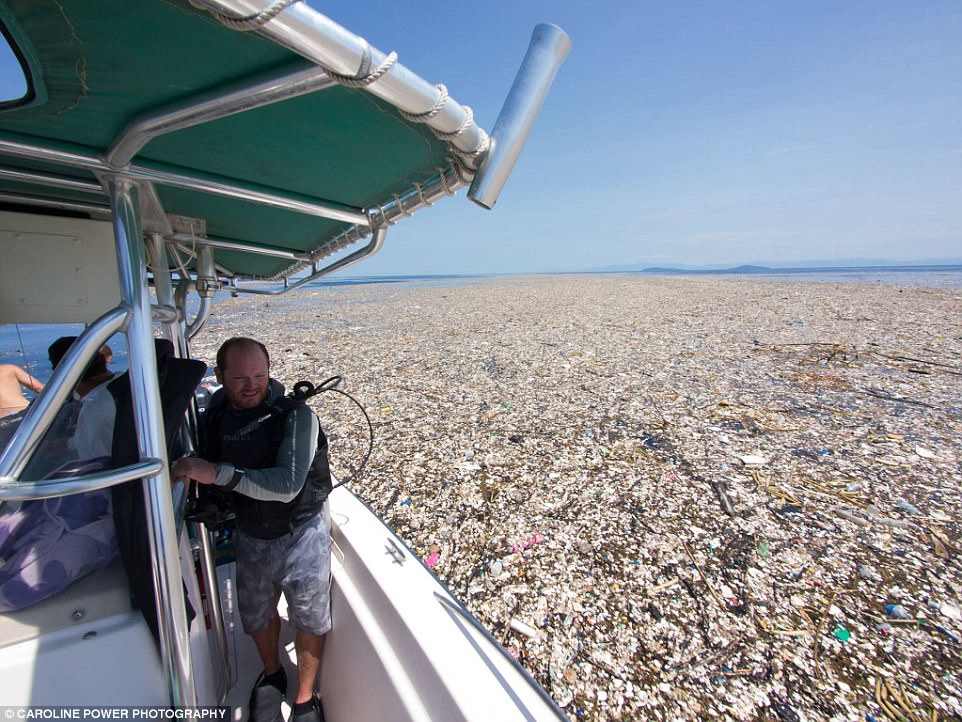 Global Warming Clock (scroll down) . Jumble Sales Donating to any local jumble sale or bring and buy sale is a useful way of supporting local organisations and recycling. Large items You can take these to the Wychavon household recycling centre but do note that it is over 12 miles away so maybe its good to accumulate enough items before making the journey. Larger trailers over 1.3m internal size will require a permit and you are limited to 12 trips a year. They accept the following items - but see their website:-
Go to top The nearest Gloucestershire household recycling centre is 25 miles away at Fosse Cross. Here is a list of what you can recycle there:-
Curiously they take used cooking oil whereas the Wychavon one does not! Trailers must be under 4ft by 6ft in size. (Wychavon is metric, Gloucestershire imperial!) No Car parts are accepted, except batteries and up to four tyres. Go to top  Gloucestershire Household Recycling Centres also accept items for reuse, as well as recycling. Currently it is piloting a reuse shop and invites members of the public to visit it during opening hours. Every site also collects bikes for the Gloucestershire Bike Project which is a not-for-profit social enterprise. It has a continually changing stock of adults and children's bikes, which are offered for sale at its Barton Street workshop. Tel: 01452 690797. If you pay £14 then bulky household waste can be collected. Here is the official list of Cotswold Recycling Centres. Printer cartridges Some charity shops take them. Unwanted Mobile Phones Register with Recycle for Charity. They also take used ink cartridges. Smoke Detectors Ideally remove the batteries and recycle as above. Remove the top plastic cover and recycle with your other plastics. Take the rest of the smoke detector to the shop where you purchased it. If they will not accept it, just put it in your usual waste. It is not illegal to throw your smoke detector in the waste but it is just better for the environment if you don't. A common misunderstanding is that the crossed-out wheelie bin on the back of the alarm means that they must not be placed in a normal waste bin. This symbol just means that the alarm falls under the WEEE regulations. Go to top Skip Hire Should you need one, the local Skip hire company is Budget Skips. Unwanted Computer Equipment Try charity shops as well as EcoIt which is a good starting point for this. Which? has a comprehensive guide. Before parting with your old computer make certain you completely delete your data (or trust the recipient to do it for you). The Royal Mint will start recovering gold from electronic waste to use in its coins and bars. It hopes its new plant in Llantrisant, South Wales, will start in 2023 salvaging the precious metal from the circuit boards of laptops and mobile phones. This now also applies to some smart phones. Coffee Pods Used coffee pods. Old Tools The RNLI lifeboats will find a good home for old tools and the money raised will add to their funds. Contact Sue White on 01386 841987. Workaid collects and refurbishes old tools (and hand sewing machines) in any condition. These are then sent to vocational training projects in poor communities around the world. Don't bin those tools no matter what their condition; let them have a new life. Dead Animals These of course can be any size from a mouse to a horse. Animals which are normally domestic pets can be buried in your garden but for others, different rules apply. Go to top Fly Tipping 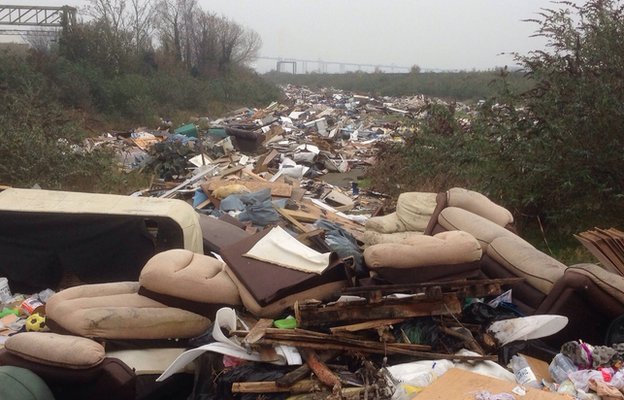 Fly tipping is totally unnecessary as the rest of this page demonstrates. In 2020 there were over 1,000,000 reported flytipping incidents in the UK. At a conservative £120 to clean up each one, this is a clean up cost of £120,000,000 this year. This is money that could more usefully be spent elsewhere. This has risen from 936,090 reported cases on public land. There were more on private land which is the land owner's responsibility. As well as being unsightly, it also costs time and (essentially your) money to clean up but can carry large fines. Some statistics on fly-tipping. Fly tipping pollutes our countryside, looks totally unsightly and threatens wildlife. Fly-tipped rubbish attracts more tipped rubbish. Here is an example of some rubbish abandoned on Willersey Hill. 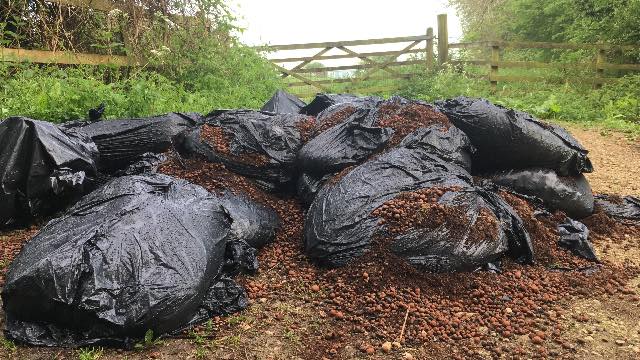 Cotswold District Council reminds householders to dispose of their waste responsibly and to only entrust their waste to an authorised waste carrier following a rise locally in the number of fly-tipping reports (in September 2022). The warning comes following a number of incidents of the illegal dumping of builders' waste - including materials such as asbestos and concrete, as well as fixtures and fittings in recent months, which have been centred mostly in and around Cirencester and the Siddington area. Since the start of April until the end of September, the Council has recorded 531 incidents of fly-tipping across the district; an increase of 15% based on the same period in 2021-22. In particular incidents of construction and demolition waste have risen by almost half during the last six months, with 33 incidents reported. Councillor Andrew Doherty, Cabinet Member for the Environment, Waste and Recycling at Cotswold District Council, said: Anyone having work done on their property should check that the person or company taking away their waste is operating legally. Residents have a Duty of Care for their waste, giving them a responsibility to ensure it is disposed of properly. This means people can risk prosecution if they haven t checked what will happen to their waste and it later ends up illegally dumped. Residents are advised to always ask for a Waste Transfer Note or receipt when their waste is taken away and familiarise themselves with their responsibilities when it comes to passing their waste over to someone else. “Fly-tipping is unsightly, poses a risk to wildlife and can pollute our waterways - it's also expensive to clear. It's not just the number of fly-tips we are seeing which is of concern but the scale. Some of the most recent incidents have needed the hire of a grab truck to remove the waste, costing £300 each time. For asbestos, a specialist contractor will be brought in to ensure the material is collected and disposed of safely. All of this is at additional expense to the Council and you, our taxpayers.” The Council also reports a significant increase in the number of tyres being fly tipped with 26 separate incidents being recorded since April, a rate of one fly-tip per week. Any individual or business removing waste from a premises should have a valid Waste Carriers Licence or exemption permit through the Environment Agency. Householders can face a £400 fixed penalty notice if fly-tipping is traced back to them. Members of the public can check whether a person or company is legally allowed to carry waste by contacting the Environment Agency on: 03708 506 506 or by visiting: Waste carriers, brokers and dealers (data.gov.uk). Businesses who fail to register for or renew a licence, can face a fine of up to £5,000. Anyone witnessing fly-tipping or who finds dumped rubbish should not touch the items. Instead, incidents can be reported to the council online or by calling the customer services team on 01285 623000 during office opening hours. Flytipping and the law and other useful information. Cotswold District Council does prosecute fly tippers. Do report fly tipping here or on this free telephone number - 0800 807060 and here is the link for Wychavon. Cotswold District Council issued three fixed penalty notices of £400 each to individuals following investigations of reports of fly tipping in January 2022 . Fly tipping is a criminal offence and those involved in the activity face fines and/or prosecution. Cllr Andrew Doherty, Cabinet Member for Environment, Waste and Recycling said: “We are seeing more illegitimate waste removal services offered to residents. These services offer unrealistically low prices by avoiding licensing and cutting corners to dispose of waste dangerously and illegally. Please make sure you check any service you use is registered and legitimate before using them otherwise you could be liable. “If you witness an incident of fly-tipping, please report it as soon as you can, that gives our officers the best chance of catching the perpetrators and by working together we can help tackle this blight on our countryside.” Although the majority of trades people and companies can be trusted to dispose of waste in a responsible manner, it is crucial to be aware that some may be operating illegally. If an operator illegally dumps someone else s waste, the owner of the waste is also liable. Kevin Lea, Enviro-Crime Programmes Officer at Cotswold District Council, explained: “It's essential that residents err on the side of caution and think twice about too good to be true low cost quotes when seeking a waste removal service. Under the Domestic Duty of Care, any resident must ensure that the service is carried out by an authorised person or company otherwise they could face a fine of £400. “When looking for a waste management company, residents should only hire someone who is registered and licensed by the Environment Agency. A reputable company will also be happy to share details of their licence number so their credentials can be checked. The company should be fully insured and a Duty of Care waste transfer note should be handed over once the rubbish has been removed. “In line with our Clean and Green initiative, our collective goal is to maintain and improve the beautiful district that we're so proud of. By working together to make things better, we can protect our environment, help people do the right thing and tackle those who do not. As a Council we'd like to thank everyone who has played their part thus far.” Household waste is generally considered to be any waste produced in a domestic property. As well as regular black bin bag waste, this also includes other material such as old mattresses, furniture and household appliances. Report illegal fly tipping. If you have any questions on fly tipping or responsible waste disposal, please email: ers@cotswold.gov.uk This map, produced in May 2019 shows fly tipping incidents in the Cotswold DC area. |
||
| Willersey has a facebook page. Go to top | Menu & Search Page Email us here:- |